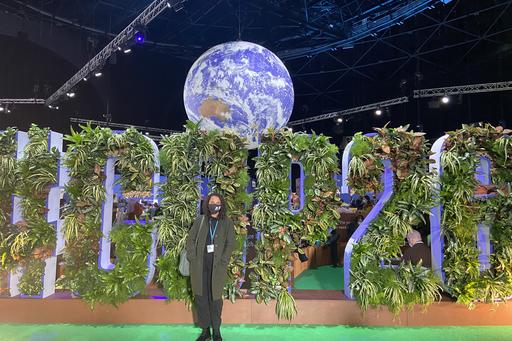- Home
- News and events
- Find news
- Researchers and students report from the climate summit
Researchers and students report from the climate summit
Several researchers and students from the University of Gothenburg attended the UN climate summit COP26 in Glasgow in early November. Two of the students and two of the researchers shared their experiences at a panel discussion that concluded the Act Sustainable Week.
Sverker Jagers was the only participant on the panel who had attended a Conference of Parties (COP) before. As a doctoral student, he attended COP4 in Buenos Aires in 1998. He took part in his second COP meeting this year as a professor of political science.
“It is remarkable that this complicated process involved in the COP meetings even functions. According to political science theories, such a long process involving so many participants would not work,” he says.
Jagers was encouraged by the fact that so much was happening at COP, where different constellations were interacting and there were many unseen processes taking place beyond the negotiations and in the official sessions. As a result, he left the Glasgow meeting with more enthusiasm than when he arrived. As one example, Jagers pointed to the insurance industry, which he has researched, where many parallel processes are ongoing that may have more significance than the policy-making process.
The financial sector’s role in climate work

Jasmine Elliot had never attended a COP meeting. A doctoral student in practical philosophy, she researches the role and responsibility of professional advisers in facilitating ethical business behaviour. She was particularly pleased to be able to participate in the COP finance-theme day and to discuss the role of the financial sector in climate work. She points out that many people in the banking sector now claim they no longer want to be associated with fossil fuels.
“At the meeting, the excitement from the negotiations extended to the side events and the exhibitions. There was a palpable sense of an urgency to act,” she says.
But Elliot takes a cynical view of the intentions of some participants, maintaining there was a lot of glossing over or “greenwashing” at the COP climate summit. Also evident at the meeting was something often referred to as “purple washing,” when participants highlight their gender equality work without much substance behind it.
Concrete actions of cities
Patricio Gallardo is one of the two students who participated in the panel. He comes from Argentina and is currently enrolled in the master’s programme in environmental sciences, focusing on water issues. He applied to participate as an observer at COP for the University of Gothenburg.
“I wanted to follow the process at the COP meeting up close. It was incredibly instructive, and I met a lot of important players from the private sector,” he says.
Gallardo’s take away from Glasgow is the leading role in climate action demonstrated by many cities. While the countries taking part talk mainly about what should be done, the representatives of cities are the ones taking concrete actions. He also found it encouraging to see evidence of the tremendous commitment by young people, the unique role science plays, and new collaborations created at the climate summit. On the other hand, he was disappointed by the hypocrisy of political leaders and the failure to make clear-cut decisions to limit global warming to 1.5 degrees Celsius.
The fourth participant to report on COP26 at Act Sustainable was Hanna Glad, who is pursuing global studies. She had heard so much about COP and wanted to participate as an observer to understand it better. In retrospect, she thinks she was naive when she went to the summit, but she returned home a bit sceptical about the COP process because so much was not discussed. But she still finds hope in all the cooperation underway, especially in civil society. The many organisations working hard on the climate issue were evident at the COP meeting.
“I wanted to gain insight into COP from the inside, which I did, and I’ve learned so incredibly much in such a short time,” says Glad.
Demand more collaboration
What, then, should the University of Gothenburg do to improve its climate work after the COP meeting? Both students point out that more collaboration among researchers and government agencies is needed and mention the important role of researchers as scientific advisers. Collaborative projects, like the Environmental Bridge, also should be given more resources to enable students to help organisations expand and improve their climate work. Patricio Gallardo points out that the recently adopted climate budget at the University of Gothenburg is a step in the right direction and believes universities should be more active in communicating with students about their climate work.
The next COP, the 27th in the series, will be held in Egypt in November 2022, but none of those who took part in the panel have any concrete plans to go there. Sverker Jagers believes it is important at the upcoming COP to discuss ways of eliminating subsidies on fossil fuels. He feels it is extremely important that carbon dioxide emissions cost money, such as with taxes. At the same time, however, we have to end different forms of subsidies that work against the point of carbon dioxide tariffs. Jasmine Elliot concludes that COP27 has to come to clearer decisions to achieve the 1.5-degree target from the Paris Agreement.
“Time is starting to run out,” the students conclude.
BY: Mikael Östblom